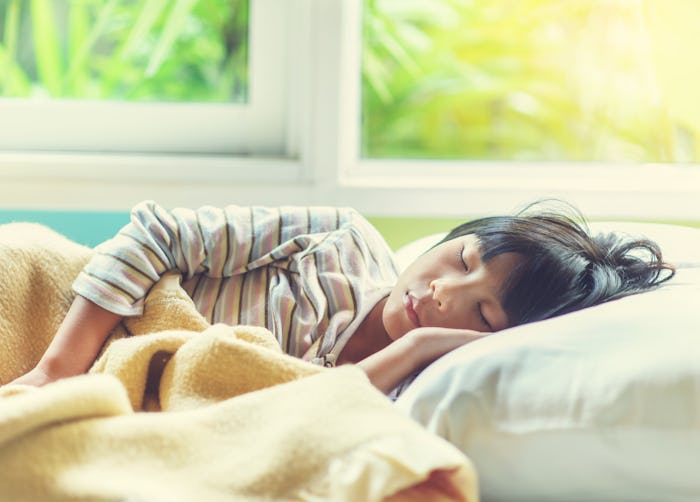Life

Before Bed Sharing With A Preschooler, Read This
It happened. Your baby is now a toddler is now a preschool and now has her very own big-girl bed because a crib and then a toddler bed just wouldn't cut it anymore. But she's out of her bed every few hours, wanting to climb in to yours and sleep with you instead. Bed-sharing (in which at least one parent and child share a place to sleep), is a controversial topic. Some parents are strongly in favor and some consider it entirely out of the question. The potential risks for infants are partially why the practice is controversial, but what about for slightly older children? Can my preschooler bed share? Is it safe?
According to the American Academy of Pediatrics (AAP) 2016 infant sleep guidelines, "...the safest place for an infant to sleep is on a separate sleep surface designed for infants close to the parents' bed." This is due to the potential for suffocation or strangulation if in bed with his or her parents. Toddlers and preschoolers are older, though, and sleeping isn't quite as high-risk for kids older than 1 year old. According to a 2011 study funded by the National Institutes of Health (NIH), however, bed-sharing with small children over the age of 1 is safe. Furthermore, the researchers conducting the study found no evidence of behavioral or cognitive issues in the children included in the study as a result of sharing a bed with their parents.
Bed-sharing with older kids (i.e. not babies) is probably more common than most people think. If your kid crawls into bed with you in the middle of the night and you both sleep there, that's bed-sharing. James McKenna, Ph.D., a professor of anthropology who also oversees the Mother-Baby Behavioral Sleep Laboratory at the University of Notre Dame, told Redbook that parents often don't talk about their older children climbing into bed with them. Additionally, there may be some evidence that sharing space with your little ones doesn't encourage the healthiest sleep habits as your kids continue to grow, so while not unsafe, it may or may not be the best choice for your family.
According to Today's Parent, researchers from the Norwegian Institute of Public Health and the University of California, Berkeley found that the longer kids and parents slept in the same space, the more frequently kids woke up during the night and less time they slept. Arguably the worst bed-sharing (or co-sleeping) set-up is when no one in the room sleeps soundly.
There seem to be positives to bed-sharing with your toddlers and preschoolers, as well, however. As McKenna wrote on the Baby Center website, there is evidence that small kids who share a bed with their parents are more confident and independent, as well as have higher self-esteem, better stress-coping mechanisms, and are more comfortable with intimacy in adulthood.
Bed-sharing can, however, put a bit of tension on a relationship, so communication is important. In terms of intimacy, each couple handles things differently, but many have found workarounds, according to the aforementioned Redbook article. And McKenna also told The Bump that there's no evidence that sharing a sleeping space with your child will eliminate intimacy with your partner. As with many other things, it's dependent on what works for you and your family.
While bed-sharing with your preschooler is safe, there may come a time, for whatever reason, when you begin to question when it's time for you child to move to his or her own bed. Cora Breuner, Ph.D., an associate professor of adolescent medicine at Seattle Children's Hospital, told Redbook that bed-sharing should most likely end by the time your kids enter adolescence, and other experts agree. By then, they're not your sweet little preschoolers anymore.